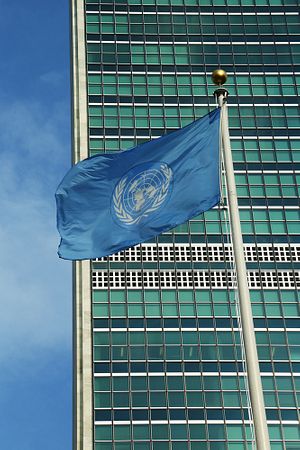Chinese President Xi Jinping will be visiting the United States next week, a trip that has been the focus of widespread media attention (particularly in the United States and China). But that means another part of Xi’s itinerary is being overlooked: his attendance and speech at the United Nations General Assembly (UNGA). It will be Xi’s first time addressing the body since assuming office in 2013.
As I pointed out yesterday, a Chinese president speaking before the UNGA is a regularly scheduled, if still rare, occurrence. Both of Xi’s immediate predecessors gave speeches at the General Assembly during the UN’s major anniversary years – Jiang Zemin in 1995 at the 50th anniversary celebrations and Hu Jintao in 2005 at the 60th anniversary. Xi’s speech, then, continues the once-a-decade tradition.
We also have a good idea already of what Xi will say. In February 2015, when China held the UN Security Council presidency, Chinese Foreign Minister Wang Yi gave a speech outlining China’s interpretation of the UN Charter. Wang particularly stressed the need to respect the sovereignty of other countries, and to allow them “their choice of development path and social system.” That same essential point – that the UN cannot and should not interfere in the domestic affairs of other countries – features in Jiang and Hu’s speeches, and will certainly be a major theme in Xi’s.
Though Xi’s speech looks routine on the surface, it’s still worth paying attention to. The reason is simple: under Xi, China has been far more active in promoting its vision for the international order, including the UN. Beijing has more clout on the world stage in 2015 than it did in 2005, and it has been using that power both inside and outside of the UN.
Inside the UN, China has been increasingly willing to throw its weight around on the UN Security Council. Since taking over the Chinese seat on the Security Council in 1971, Beijing has issued a total of nine vetoes – and four of those have come in the past five years.
China has also been more active in creating alternative multilateral organizations that speak to its own vision of international relations. The Asian Infrastructure Investment Bank (AIIB) is probably the most famous example, but there are others as well: the new emphasis on making the Conference on Interaction and Confidence-Building Measures in Asia (CICA) into a major regional organization; the push to expand the Shanghai Cooperation Organization; the potential for a multilateral organizational foundation for China’s “Belt and Road.”
China’s vision for the UN may not have changed, but that vision has never been more relevant for the world than it is under Xi Jinping. Beijing has long insisted that it does not want to overthrow the world order, but it’s been equally open about the need for reform. As Wang put it in his speech at the Lanting Forum, “China is a staunch supporter of the current international order” but “[o]f course, the international order and system also need to keep abreast of the times.”
Wang continued, saying that the international order “should go through reforms and be adaptive to development and progress in international relations. It should better reflect the legitimate call of developing countries and better enable countries to address emerging global challenges.”
China’s new organizations reflect its main goal of seeking better representation and influence for developing countries (which, in turn, will prevent the UN and Western countries from “interfering” in the developing world). Xi’s UN speech will also touch on the potential for reforming the 70-year-old body, a proposal China has had little success with in other organizations (see: the IMF). But if nothing else, it wins China brownie points among the developing countries it purports to champion.
Xi will make a special point of focusing on the developing world in his UN trip, which will see the president co-host a high-level roundtable on South-South cooperation. The goal of the roundtable is “to bring South-South cooperation to a new height,” according to Wang.
In his speech previewing Xi’s trip, Wang provided more details on what Xi hopes to get out of his UN visit: “President Xi’s visit to the UN will focus on peace and development and the building of a new type of international relations featuring win-win cooperation.” The Chinese slogan of “win-win cooperation” is an old one, but the idea of a China-led “new type of international relations” is new – and bears close consideration.

































